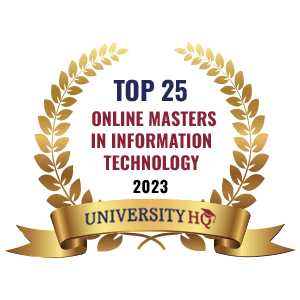What is Computer Information Technology?
New Hampshire may be a rather small state, but it's a big part of the New England economy. New Hampshire's proximity to Boston means that its economy tends to be a bit more robust than it might be otherwise. Rather than a modest collection of farms and hamlets, New Hampshire is home to state-of-the-art manufacturing, business services, and more - yet it still maintains its bucolic personality.
New Hampshire makes its largest economic impact based on its real estate. After all, it's got a terrific location in New England, a bit of luck that pays $12 billion in annual revenues. While this is only the 38th largest real estate sector in the United States, New Hampshire also has a small footprint. Meanwhile, its second strongest sector is professional and business services. This collection of services includes waste removal, property management companies, business consulting firms, and information technology firms.
A computer science or computer information technology professional is a high-tech worker who focuses on the technology of their company. IT professionals oversee a company's networks, databases, hardware issues, and software solutions. This also covers aspects of cyber security and E-commerce. In fact, IT is ubiquitous in contemporary organizations of all kinds.
Most computer information technology professionals have historically worked in office buildings, where they have easy access to their employer's computers. However, advances in networking technology have enabled many to work from remote locations. The COVID pandemic expanded the number of IT professionals who work from home or some other remote location. Many of these professionals still visit the office from time to time for meetings or those system-wide projects that require their physical presence. But many IT workers, such as database managers, can work from home and many have worked as remote consultants for many years prior to the pandemic.

Featured Online Programs
Online Information Technology Education in New Hampshire
The third strongest economic driver in New Hampshire is its education, social services, and healthcare sector. Close behind, delivering nearly $10 billion in annual revenue, is New Hampshire's manufacturing sector. This industry was once the domain of paper makers and grain mills but now it has pivoted to high-tech electronic components and other cutting-edge products. It's clear that New Hampshire is positioned for success in the 21st century.
Given that most industries rely on information technology, the New Hampshire legislature has made sure that the state's colleges and universities have fully funded information technology degree programs. This includes IT degree programs in community colleges, four-year colleges, and universities. In response to the legislature's confidence and funds, IT faculties are deploying their resources to attract the top IT instructors and full-time faculty members. Since New Hampshire is in the middle of one of the best academic environments in the nation, they’re likely to have an easy time attracting the best faculty members possible. Freshly minted PhDs from top institutions love to come to New Hampshire for tenure track positions, and local IT experts with master’s degrees are also top picks.
Local IT professionals are a great choice to educate undergraduates because they can bring real-world experiences and scenarios into the classroom. Students are thus inspired by not only scholarly work but practical applications. Those students interested in completing computer science or information technology programs will have plenty of options throughout the state, and in nearby states. These options include degrees in software development, computer science, computing technology, software engineering, and plenty of employment opportunities. Top New Hampshire schools offer information technology programs that will train you to analyze complex computing problems, programming languages, and more. Options include Granite State College, UNH Manchester, Southern New Hampshire University, and more.
Online Associates (AS)

Many computer information technology professionals get their start with an associate computer information technology degree from a New Hampshire community college or through an online information technology degree. Since employers are more interested in skills than degrees, a savvy community college student can leverage their associate degree into a successful career. They can build on their associate IT degree with experience and professional certifications that attest to specific skill sets.
On top of this, an associate computer information technology degree is a wise financial decision. Community college students pay far less for their credit hours than their peers in four-year colleges and universities. Thus, even those who decide to transfer into a bachelor’s information technology degree program come out with less of a financial burden than if they'd spent all four years in a university. In fact, many graduate from a community college and then work for a few years before returning to complete their undergraduate education. These savvy students may be able to use an employer's tuition reimbursement program or can continue working while completing their education via an online bachelor’s information technology degree program from a top program.
Online Bachelors (BS)

Most employers like to hire workers with a full, four-year bachelor’s computer science or computer information technology degree. This is because a four-year diploma gives them the confidence that they're hiring an IT professional who has an in-depth understanding of the technologies that power their organization, such as computer information systems. Bachelor’s degree programs also help to instill soft skills and professional skills that may be hard to quantify, but which can make or break a career. For instance, an IT professional who can write readable, grammatical reports for their supervisor may make more of an impact than their peers.
Bachelor’s degree students can also take on minor concentrations that inform their work in information technology. Popular options include subjects such as mathematics, statistics, management, or computer science. Students don't necessarily need a concentration or minor, but those who use their elective courses to further develop their education will surely benefit.
On top of this, IT students can broaden their horizons with experiential learning in internship programs. These courses allow students to learn with a professional mentor on-site while also working with a faculty member who can monitor their progress from a more academic perspective. When a student has one or more internships on their resume, they are often able to attract interview opportunities from New Hampshire's top firms.
Find Your Online Information Technology Program
Online Masters (MS)

These days, a master’s degree is almost a requirement for long-term success in any field. Information technology professionals have a few options when it comes to how they manage their higher education. Since the field is found throughout the economy, IT professionals may find that they need to focus their master’s computer information technology programs in a way that caters to their specific industry. For instance, they may work for an engineering company that has specific needs.
Most will need a master’s IT degree program that builds on their networking, database, or other IT work. Another popular choice is to pursue an MBA with a concentration in computer information technology. Still another option is a dual-MBA that pairs a master’s computer information technology degree with an MBA.
A dual-MBA is a very intensive course of study. Most students are unable to work while in such a program. However, once completed, this three-year option will make any resume look irresistible in the job market.
Online Doctorate (PhD)
A PhD in computer information technology is still more of an outlier in corporate America. Employers respect a doctorate, but they don't often seek a PhD for their IT staffing needs. That may be changing as the IT environment becomes more and more complex and intellectually rigorous. Furthermore, some IT areas may be more accepting of a doctorate, such as cyber security and cryptography. However, you are more likely to find either very broad or very specific PhD programs, such as those in computer science or cyber security, so it's best to know what you're looking for going in.
A PhD is still a very valuable pursuit for a computer information technology professional. This path enables students to pursue research in areas that may be inaccessible from a corporate job. They can thus pursue and develop these interests in ways that may yield the next hot IT start-up. Otherwise, a computer information technology doctorate may be useful in consulting. Consulting firms need to have consultants with top credentials if they're going to attract the best clients and projects. Many PhD candidates complete their studies and start consulting firms of their own.
And, of course, there is always the option to work as a professor once you complete your PhD. This degree will give you access to the highest roles in academia.
Become an Information Technology Specialist in New Hampshire
Computers are ubiquitous these days. Older folks are still amazed at how whole generations have grown up with the internet when they were barely aware of computers until they graduated from college. Thus, it may seem that becoming a computer information technology professional is something that comes naturally. However, this is not the case. Today's students still need to become aware of how to best position themselves for success in the information technology world.
Find Online Information Technology Programs
The best way to get a start is by starting early, even in high school. Students who have a keen interest in computers are urged to seek out STEM-focused high schools, which may offer more IT or computer science courses than standard schools. They can also start looking into the multitude of learning resources available online. There are many free and very affordable courses online that help students get a start on a career in information technology. One accessible way to start learning is with a web development course. Once students get the hang of programming in HTML and CSS, they can move on to JavaScript, Python, and other languages.
There are also many certification courses available online. For a student who's still in high school, it may be useful to take the courses and start experimenting with the new knowledge without paying for the certification. Resources, such as Coursera, offer courses from major universities that are free to take and only charge for a certificate of completion. Some may even offer college credit, but those are sure to be more expensive.
When it comes time to find an undergraduate computer information technology degree program, students need to confirm that their program is fully accredited. Most should have a CHEA-approved regional accreditation. However, if a student finds an ABET-approved program, they should strive to enroll. ABET is an agency that focuses on STEM degree programs, and their credentials are universally respected.
Potential Careers for IT (CIS) Graduates
-
Graphic Designers
This field has become a perfect blend of art and technology. Graphic designers need to have expertise with programs such as Photoshop, Illustrator, and Blender, among others. Designers often work in advertising but any firm that produces in-house publications may need a graphic designer.
-
Data Entry Keyers
This is an entry-level position that requires very high speed with a 10-key keypad and the QWERTY keyboard. Data entry keyers take hard copies of various forms and enter data into a database. While this may be a career choice, many will want to use the experience as a first step towards a career.
-
Special Effects Artists and Animators
This is a growing field that requires great vision on top of great technical skill. While many may chase the brass ring of a special effects career with a Hollywood studio, these skills can be applied in other areas. Successful careers in animation and special effects can be found working on any sort of video content.
-
Computer Science Teachers, Postsecondary
This career option requires a master’s computer science degree as a minimum standard. Computer science instructors with a master’s degree are often hired for adjunct, part-time positions, but community colleges may take them on for full-time positions. Those with the most success have the strongest academic backgrounds, as well as practical experience in the working world.
-
Computer Hardware Engineers
This field requires a degree in computer engineering that focuses on hardware issues. Hardware engineering involves high-tech work with a computer's motherboard, processing chips, and other bits of hardware. Some hardware engineers work on other parts of the hardware picture, such as setting up network cables and routers.
-
Data Scientists
This is a relatively new and rapidly growing field. Data scientists are skilled at working with huge troves of data, colloquially known as big data. They are experts in both statistical analysis and computer modeling. Data science experts are typically experts in either the coding language Python or R. Scientists who know both languages are a double threat.
-
Web and Digital Interface Designers
These IT experts are experts in coding HTML, CSS, and JavaScript. Their primary focus is on creating a pleasing and practical experience for their end-user. They need to work with the web developers who are coding the back-end technologies that make the website function.
-
Web Developers
Rather than creating a pleasing aesthetic experience for an end-user, web developers make sure that the website functions as needed. These IT workers connect the front-end of a website to databases, payment processing outlets, and a server that delivers the necessary data.
- Computer Programmers
These technology workers are the backbone of the industry. Programmers typically specialize in two or three coding languages that determine the sorts of software they work on. Most will write code that maintains a piece of software and others may write small scripts or create smaller computer widgets that suit their client's needs.
- Software Quality Assurance Analysts and Testers
- Software Designer/Developers
- Network and Computer Systems Administrators
- Database Architects
- Database Administrators
- Computer Network Architects
- Computer User Support Specialists
- Information Security Analysts
- Computer Systems Analyst
- Computer and Information Systems Managers
- Chief Executives
- Business Analyst
- Cyber Security Analyst
- UI Developer
- Application Developer
- IT Project Manager
- Full Stack Software Developer
- Network Analyst (WAN/LAN/etc.)
Search All Programs
